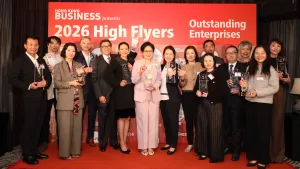Web experience on mobile will define enterprise mobility
By Varun Jaitly2014 was a blockbuster year for smartphones, with 1.3 billion shipped in 2014, that is up 27.6% from the 1.02 billion figure in 2013, according to the latest data from IDC [1]. As smart devices adoption continues to grow at an exponential pace, enterprise mobility has become a greater area of focus for organisations.
Of all Asian countries, smartphone usage is most widespread in Hong Kong, 96% of people in Hong Kong use their smartphone to go online every day [2]. With increasing penetration of smartphones in Hong Kong, organisations that enable their workforce with mobility and collaboration will have a clear advantage over those that fail to do so.
According to IDC, enterprises are on the cusp of unlocking greater value from mobility by integrating collaborative applications and video tools into their overall enterprise mobility strategy [3]. What does this mean for organisations in Hong Kong?
Most organisations now allow access to services such as email and calendar on phones and tablets, but few go beyond these basics. In order to truly take mobility, productivity, and collaboration to the next level, organisations need to invest in bringing more applications to mobile devices.
These applications range from sales tracking to customer care, and we're seeing more organisations aligning themselves to this strategy. An IDC survey of more than 500 executives across Asia Pacific found that raising productivity, improving customer service, and lowering cost of operations are among the top reasons why investing in mobility makes sense [4].
Mobility and collaboration:
Mobile is a natural next for collaboration applications that exist in the enterprise infrastructure. An example of this would be the adoption of iPads and mobile phones in retail, what can recall your memory is you can now order a custom-made cake on iPads at maxim’s cakes stores.
It's becoming common for organisations to enable sales and customer service personnel with tablets as it helps provide them information about products, pricing, and inventory to end customers.
Similarly, some restaurants like Itacho Sushi have tablets placed on tables to empower customers to self-order. Such restaurants are able to improve efficiency, give more control to customers, and enhance the overall experience.
A workforce which is mobile and collaborative is a strong resource for any enterprise and can have a direct positive impact on an organisation in the form of employee productivity, customer service, and sales. While the advantage of bringing mobility into an organisation is clear, it's also important to note some of the challenges that could risk success.
Challenges:
There are a couple of factors that can define success or failure for enterprises trying to achieve a greater level of mobility. At the back end there would always be a juggling act of prioritisation and resource allocation, but one of the biggest challenges could be that of performance on mobile devices.
As employees and partners access information via applications or webpages over mobile devices, usually connecting to origin servers over the public Internet, the performance and in turn the user experience, suffers greatly.
The reason for a below average user experience and as a result, low adoption rate of enterprise mobile applications can be lack of focus on delivery optimisation. Without optimisations for delivery and acceleration of content either on the webpage or an app, end users are at the mercy of mobile and Internet networks that can deteriorate user experience due to network performance, congestion, and ISP relations.
While it's clear that enterprise mobility is required to be an area of focus, organisations need to concentrate on experience and adoption triggers in order to secure the investment of effort and resources.
Therefore, when laying out a mobile strategy, organisations should take an experience first strategy and concentrate on employing a solution that is scalable and can accelerate applications over the public Internet to enhance performance and adoption.
Source:
1. https://www.idc.com/getdoc.jsp?containerId=prUS25407215
2. https://www.go-globe.hk/blog/smartphone-usage-hong-kong/
3. IDC Research – Redefining Enterprise Mobility – Whitepaper https://www.techrepublic.com/resource-library/whitepapers/idc-research-redefining-enterprise-mobility-and-increasing-success-with-mobile-collaboration/https://www.techrepublic.com/resource-library/whitepapers/idc-research-redefining-enterprise-mobility-and-increasing-success-with-mobile-collaboration/
4. Same as 3




















 Advertise
Advertise





